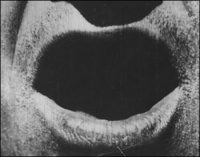Public speaking
From The Art and Popular Culture Encyclopedia

Illustration: a close-up of a mouth in the film The Big Swallow (1901)
|
Related e |
|
Featured: |
Public speaking is the process of speaking to a group of people in a structured, deliberate manner intended to inform, influence, or entertain the listeners. The art and science of public speaking, especially in a North American competitive environment, is also known as forensics. The word "forensic" is an adjective meaning "of public debate or argument." The word is derived from the Latin forensis, meaning "of the forum." The sense of the word "forensic" that means "pertaining to legal trials" dates from the 1600s (Oxford English Dictionary) and led to the use of the word "forensics" in reference to legal evidence.
History
Early training in public speaking took place in ancient Egypt.
The first known Greek work on oratory, written over 2000 years ago, elaborated principles drawn from the practices and experience of orators in the ancient Greek city-states. In classical Greece and Rome, the main component was rhetoric (that is, composition and delivery of speeches), and was an important skill in public and private life. Aristotle and Quintilian discussed oratory, and the subject, with definitive rules and models, was emphasised as a part of a liberal arts education during the Middle Ages and Renaissance.
The art of public speaking was first developed by the ancient Greeks. Greek oration is known from the works of classical antiquity. Greek orators spoke, on their own behalf rather as representatives of either a client or a constituency, and so any citizen who wished to succeed in court, in politics, or in social life had to learn techniques of public speaking. These skills were taught first by a group of self-styled "sophists" who were known to charge fees, to "make the weaker argument the stronger," and to make their students "better" through instruction in excellence. Plato, Aristotle, and Socrates all developed theories of public speaking in opposition to the Sophists, and their ideas took on institutional form through the development of permanent schools where public speaking was taught. Though Greece eventually lost political sovereignty, the Greek culture of training in public speaking was adopted virtually wholesale by the Romans.
With the political rise of the Roman Republic, Roman orators copied and modified Greek techniques of public speaking. Under Roman influence, instruction in rhetoric developed into a full curriculum including instruction in grammar (study of the poets), preliminary exercises (progymnasmata), and preparation of public speeches (declamation) in both forensic and deliberative genres. The Latin style was heavily influenced by Cicero, and involved a strong emphasis on a broad education in all areas of humanistic study (in the liberal arts, including philosophy), as well as on the use of wit and humor, on appeal to the listener's emotions, and on digressions (often used to explore general themes related to the specific topic of the speech). Oratory in the Roman empire, though less central to political life than in the days of the Republic, remained important in law, and became (under the second Sophistic) an important form of entertainment, with famous orators or declaimers gaining great wealth and prestige for their skills.
This Latin style was the primary form of oration in the world until the beginning of the 20th century. After World War II there began a gradual deprecation of the Latin style of oration. With the rise of the scientific method and the emphasis on a "plain" style of speaking and writing, even formal oratory has become less polished and ornate than in the Classical period, though politicians today can still make or break their careers on the basis of a successful (or unsuccessful) speech. Abraham Lincoln, Adolf Hitler, Marcus Garvey, John F. Kennedy, Bill Clinton, and Barack Obama all advanced their careers in significant part by their skills in oratory.
These basic principles have undergone modification as societies and cultures have changed, yet remained surprisingly uniform. The technology and the methods of this form of communication have traditionally been through oratory structure and rely on an audience. However, new advances in technology have allowed for more sophisticated communication for speakers and public orators. The technological and media sources that assist the public-speaking atmosphere include both videoconferencing and telecommunications.
See also
- Audience response
- Crowd manipulation
- Debate
- Eloquence
- List of speeches
- Orator
- Rhetoric
- Public speaking anxiety

